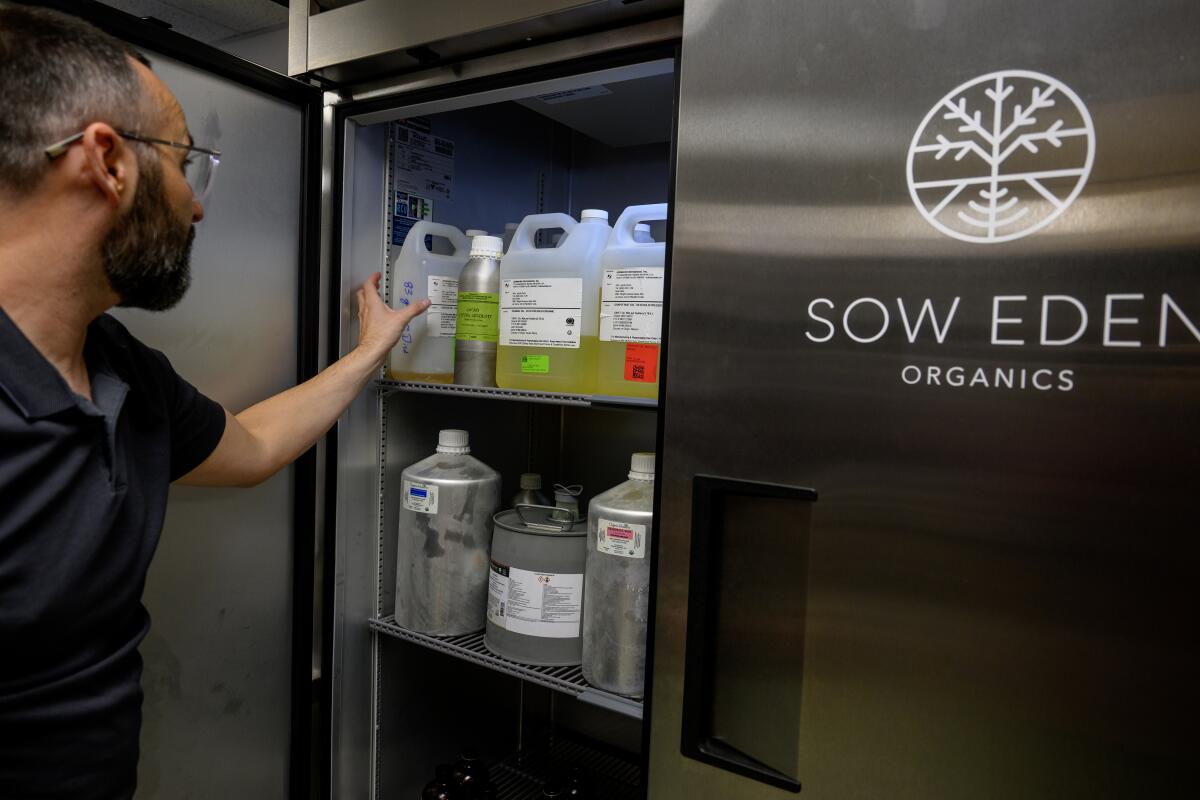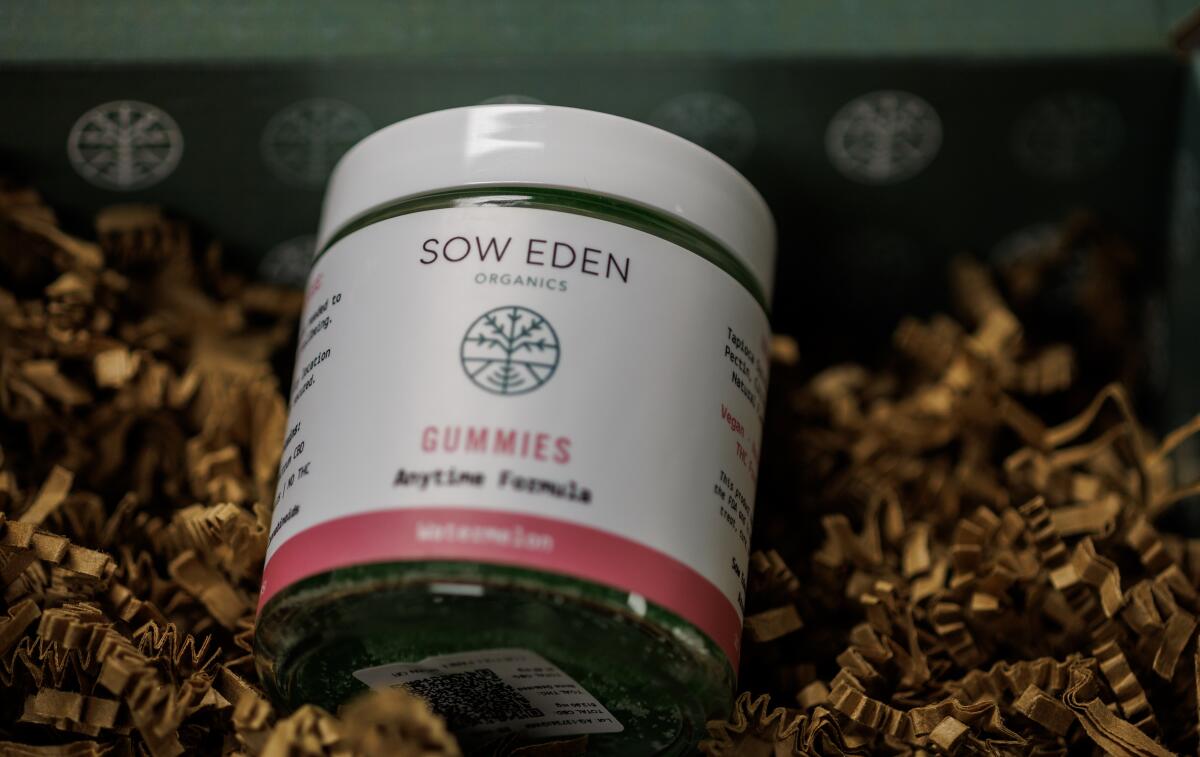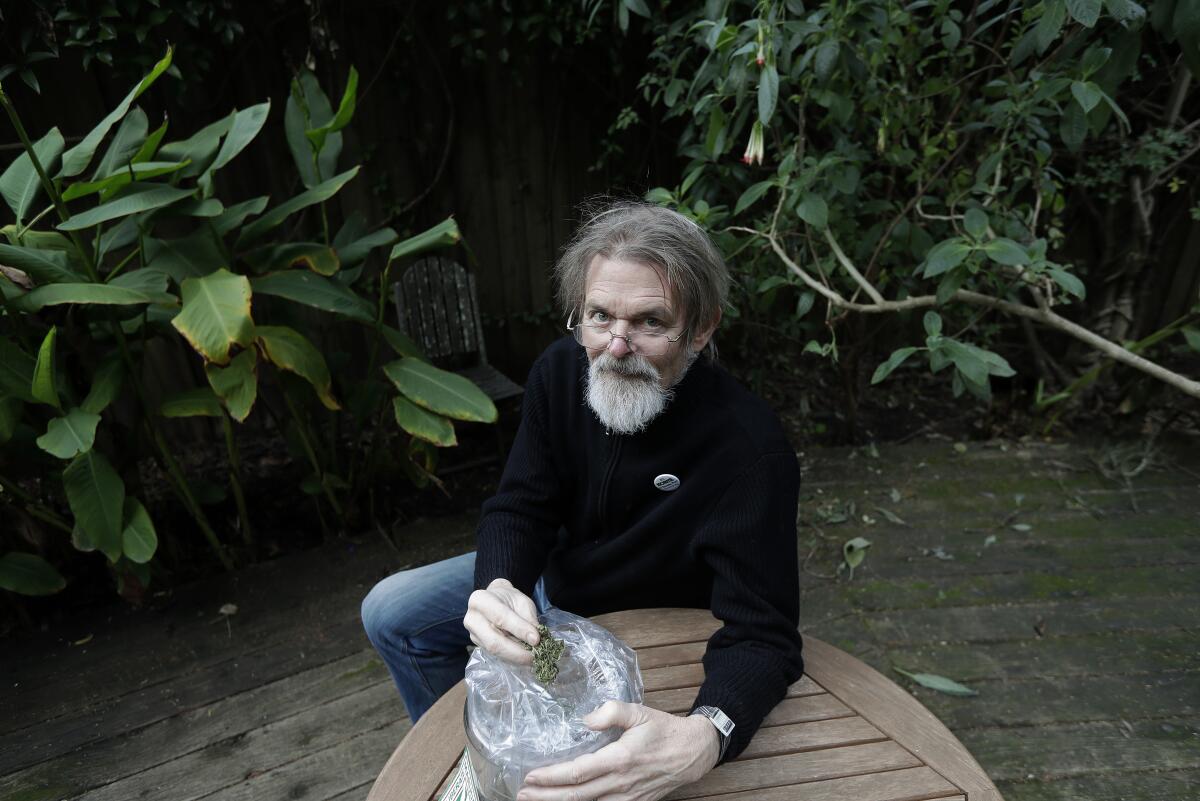Earlier this month, Gov. Gavin Newsom proposed new emergency restrictions on the cannabis industry in California, citing the urgent need to protect children. His concern: a loosely regulated class of products containing intoxicating levels of THC, the compound known to make cannabis grow.
While many agree that some changes are needed, several business owners and consumers fear the governor’s new rules are too strict and will bring the fledgling industry to its knees just as it hits the mainstream.
Critics say proposed regulations would effectively ban a wide range of tinctures, capsules, beverages and other popular products derived from industrial hemp, including products containing primarily CBD, a non-intoxicating cousin of THC.
These types of offerings, which range from CBD soft gummies to THC-enhanced beverages, are gaining popularity. While they may have similar effects, these hemp-based products differ from the THC-derived cannabis products sold in many licensed dispensaries.
Hemp products are widely available at liquor stores, gas stations and smoke shops, which the governor cited as one of the main concerns leading to his action.
Newsom announced the state’s proposed emergency rules on Sept. 6 after a bill to regulate the hemp industry failed in the state legislature. The regulations are still subject to administrative review; if passed, it would make it illegal for hemp products to contain any “detectable” amount of THC.
The proposed rules also ban a list of about 30 “comparable” compounds known as cannabinoids, some natural chemicals and others synthetic that mimic the effects of THC, short for tetrahydrocannabinol.
Most cannabis industry advocates acknowledge the need to change regulations to make the product safe and available only to adults, but said Newsom has gone too far with his zero-tolerance approach.
Among those affected are Jacob and Lindsey Dunn, owners of Sow Eden Organics, which operates out of a small space in La Verne. They manufacture, package and ship a variety of industrial hemp tinctures and gummies that consumers consume to improve sleep or relieve pain, anxiety and other ailments.
When the Dunns, who have a 2-year-old son and another on the way, met a decade ago, Jacob was still working from his kitchen table, selling CBD capsules to medical dispensaries. They currently have about $500,000 in annual gross sales, but Jacobs said new regulations could halve that total overnight because many of their products contain low levels of THC.
For example, each of Sow Eden’s popular sleep aids contains 2.5 milligrams of the compound. Many recreational cannabis products contain 5 to 10 milligrams or more.
Jacob Dunn has some Sow Eden Christmas gummies.
(Gina Ferazzi/Los Angeles Times)
“It’s a small, family-owned business,” Lindsey Dunn said Monday. “It’s hard to know if we can launch a new product right now… It’s a big deal. It’s a big expense.”
Newsom’s office and the state Department of Cannabis Control referred questions to the California Department of Public Health, which said the emergency rules are in response to “an increase in health incidents related to hemp products sold by state regulators across the state.”
The agency said it has “received an increasing number of complaints about illegal industrial hemp products in the retail environment.”
If approved by the state Office of Administrative Law, the emergency rules would remain in effect for at least 180 days. The governor said affected products should be pulled from shelves immediately after the changes are implemented.
Both cannabis and THC are strictly controlled by federal law. But hemp, a low-THC version of the cannabis plant that has long been used for commercial products like paper and rope, has seen a surge since the 2018 Farm Bill eased federal restrictions.
Across the country, states are grappling with how best to handle the growing interest in consumer products containing hemp-derived THC.
Some states have embraced this trend. In Minnesota, one forecaster estimates that hemp-based beverages could generate $200 million in annual sales. The state has established registration and testing requirements. hemp beverage festival in minneapolis In June, community members were allowed to take samples from dozens of barrels. “Smoking is prohibited,” the sheet reads.
Advocates say the approach limits access to seniors while allowing the industry to continue to grow and thrive.
In Missouri, the lawsuit contributed to the return of the state Governor Mike Parson’s executive order to regulate hemp products less than two months after his announcement. New restrictions also in New Jersey facing legal difficulties.

Jacob Dunn keeps Sow Eden essential oils in the refrigerator. Dunn is concerned that Gov. Gavin Newsom’s proposed new regulations on the hemp industry could cut his company’s sales in half.
(Gina Ferazzi/Los Angeles Times)
Companies that make hemp products say a blanket ban is wrong.
“It’s catastrophic for a lot of people,” said Christopher Lackner, president of the Hemp Beverage Alliance, a Colorado trade group.
“Why does it have to be controversial?” he said. “Regulate it, put it on the shelves next to beer or wine or seltzer, age it and tax it like an adult beverage, regulate it like an adult beverage. And everybody wins.”
Ajay Narain, chief executive of Beacon Beverages, based in Campbell, near San Jose, said his company switched from alcoholic beverages to non-alcoholic cocktails infused with hemp-derived THC and CBD in February.
Business started slowly but took off when Beacon’s lime margaritas and non-alcoholic gin and tonics hit the shelves of major retailers like BevMo and Total Wine & More.
Now, Narain says he’s worried that Newsom’s “senseless” new rules will effectively “kill the industry” statewide.
“A lot of businesses are closing,” Narain said. “He just pulled the rug out from under them. And I repeat, it’s completely unnecessary. Set it up, don’t take it down.”

Across the country, states are grappling with how to deal with the growing interest in consumer products with hemp-derived THC.
(Gina Ferazzi/Los Angeles Times)
In 2021, Newsom passed a state law limiting the total concentration of THC in hemp-based foods, beverages and cosmetics to 0.3% and specifying how these products should be tested and labeled.
But Newsom and members of his administration say many businesses are using “loopholes” that allow them to sell products with intoxicating levels of THC in places where minors can buy them.
On a recent Tuesday night, a lid at the end of the aisle outside a BevMo location in Torrance revealed an array of flavored cans including lemon, lavender and old-fashioned cocktails. Below each row of drinks are signs with the words “THC INFUSED” in bold.
A study released this month by BDSA, a Colorado-based company that analyzes data from the cannabis and hemp industry, noted that the product has “created a profitable niche that has avoided many of the challenges facing the regulated cannabis industry.”
“Unlike their cannabis counterparts, these products can be produced, distributed and sold with minimal legal hurdles, making them a hot commodity,” the report says.
Some stakeholders, such as the California chapter of the National Organization for the Reform of Marijuana Laws, or Cal NORML, say Newsom is right to limit sales at regular retailers.
But they denounce the harm the proposed regulations could cause to people with health and mental health problems who benefit from non-alcoholic products that would also be illegal.
“We fully support keeping intoxicating hemp products off the retail market… but they are going too far. They are going after these hemp medicines that have been widely used for years,” said Cal NORML Director Dale Gearinger.

Cal NORML’s Dale Gearinger says the proposed regulations could harm people with health and mental health issues who benefit from non-alcoholic products that have been “widely used for years.”
(Jeff Chiu/Associated Press)
Ted Whitney, beverage director for Danville-based Cheech & Chong Global Holdings, which sells recreational cannabis products as well as intoxicating hemp products, said hemp could be a nine-figure industry within a decade without the coming changes.
It remains to be seen whether the state will be able to fulfil this optimistic forecast. The recreational market, undermined by illegal dealers and stifled by high taxes and bureaucracy, is tough compared to that of some states.
Whitney argued that intoxicating cannabis is safer than other popular products like tobacco and alcohol. The best way to keep children safe and grow the state’s economy, he said, is to take a measured approach.
“We can improve safety, we can improve regulation and we can improve revenue,” he said. “Let’s make this a win-win situation.”
